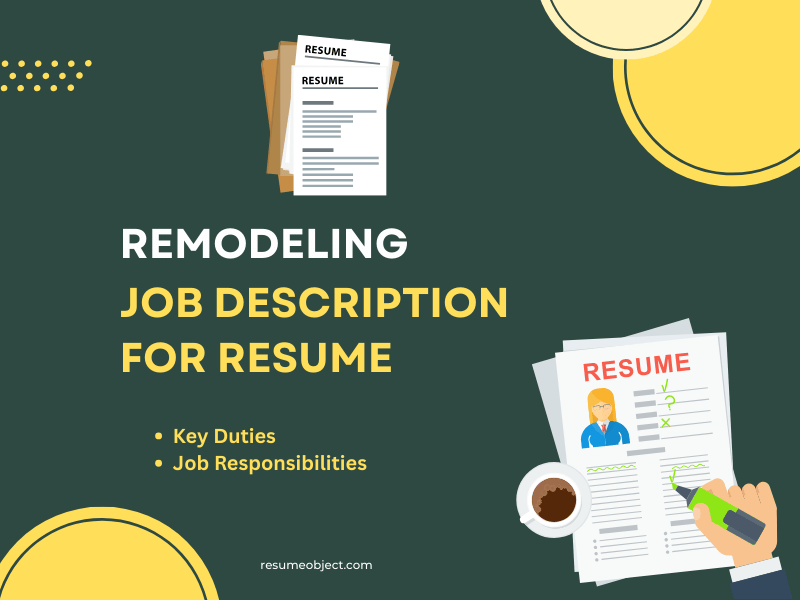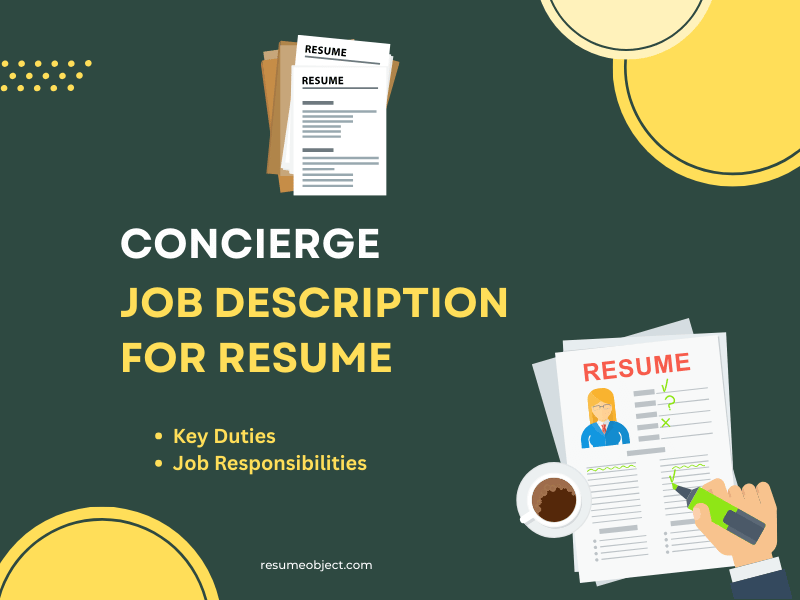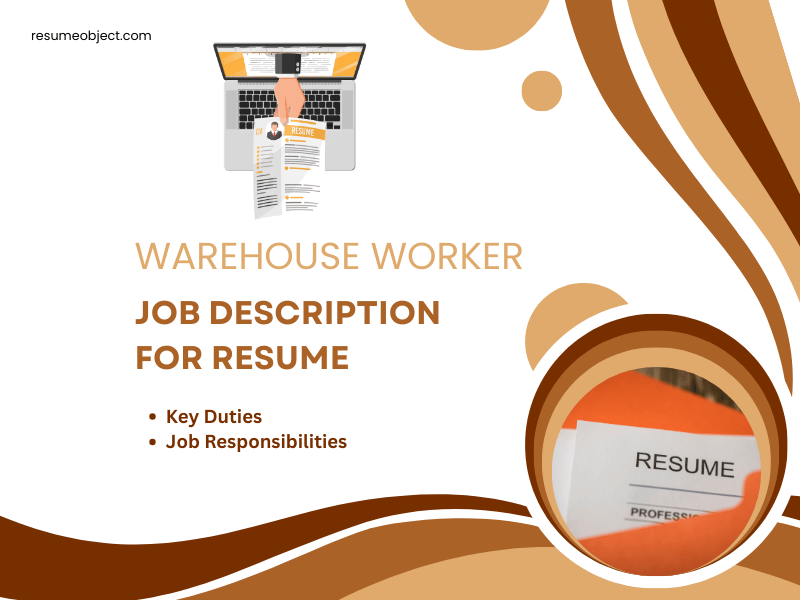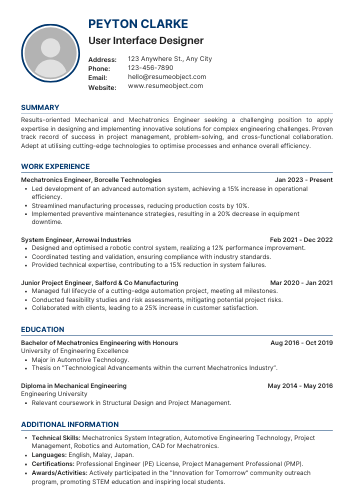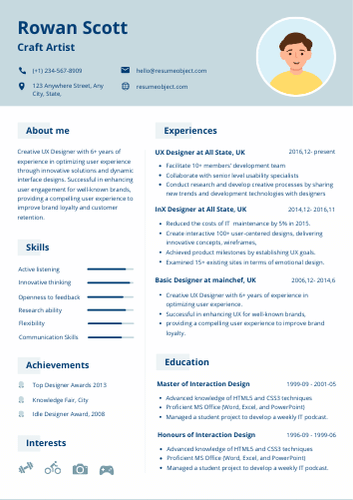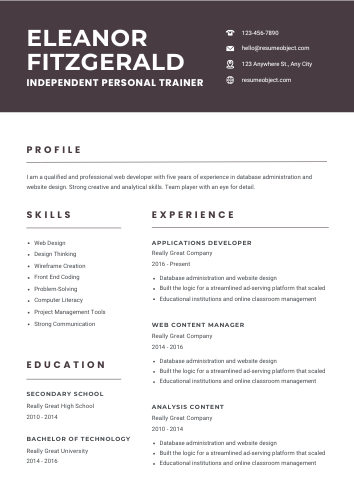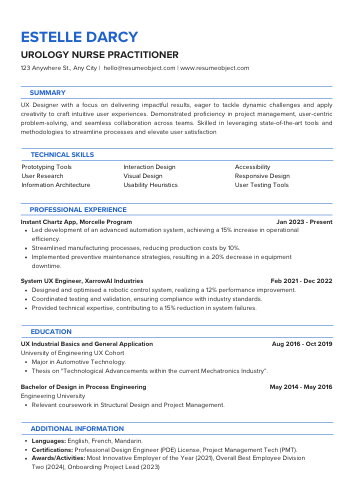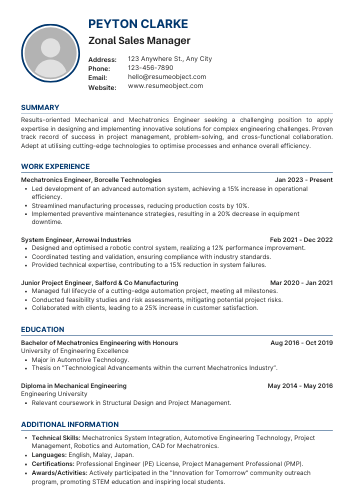Logistics Job Description for Resume in 2026 – Key Duties, Responsibilities, Action Verbs
Logistics Job Description for Resume
A well-crafted logistics job description for your resume can set you apart in a competitive job market. This vital role encompasses a range of responsibilities, from managing supply chain operations to coordinating transportation and inventory management. Understanding the key duties and action verbs associated with logistics positions is essential for showcasing your skills and experience effectively.
In this article, we will explore the core responsibilities of logistics professionals and provide actionable insights on how to present them on your resume. By highlighting your expertise in logistics, you'll demonstrate your value to potential employers and increase your chances of landing that desired position.
Logistics Job Description for Resume
Logistics refers to the detailed coordination of complex operations involving people, facilities, and supplies. Its primary purpose is to ensure the efficient flow of goods from the point of origin to the final consumer, encompassing transportation, warehousing, inventory management, and order fulfillment. In various industries, including retail, manufacturing, and e-commerce, logistics plays a crucial role in maintaining supply chain efficiency, minimizing costs, and enhancing customer satisfaction.
Careers in logistics span entry-level roles, such as logistics coordinators, to mid-level positions like supply chain managers, and senior roles, including logistics directors. The work environment typically includes warehouses, distribution centers, and corporate offices, where professionals collaborate across departments to optimize processes and solve logistical challenges, ultimately contributing to the organization's operational success.
How a Logistics Job Description Enhances Resume
A strong job description is crucial for a Logistics resume as it effectively showcases your qualifications and aligns your skills with the employer's needs. Here's why this section grabs recruiter attention:
- Relevance: A well-crafted job description highlights your experience in logistics, ensuring recruiters see your direct fit for the role.
- Achievements: By detailing specific accomplishments, you demonstrate your capability to deliver results in logistics, making you a more attractive candidate.
- Measurable Impact: Including quantifiable outcomes (e.g., cost savings, efficiency improvements) in your logistics resume illustrates your contribution to previous employers, setting you apart from other candidates.
Additionally, many companies use Applicant Tracking Systems (ATS) to screen resumes. A strong job description that incorporates relevant keywords increases the chances of your logistics resume passing through these systems. This means:
- Keyword Matching: Using industry-specific terms ensures your logistics resume aligns with the job posting, improving visibility to recruiters.
- Enhanced Visibility: A keyword-optimized logistics resume is more likely to be seen by hiring managers, leading to better job prospects.
In summary, a strong job description is essential for making a strong impression and increasing your chances of landing an interview in the logistics field.
Learn more about optimizing your resume by visiting our full guide on Marshalls Job Description for Resume.
Logistics Job Description Examples
Entry Level Resume Job Description Examples
-
Logistics Coordinator: Assist in coordinating the movement of goods from suppliers to customers, manage inventory levels, and support the logistics team in optimizing transportation routes and schedules.
-
Warehouse Associate: Responsible for receiving, storing, and shipping products while maintaining accurate inventory records. Assist in organizing the warehouse and ensuring compliance with safety regulations.
-
Supply Chain Assistant: Support supply chain operations by tracking shipments, managing documentation, and liaising with vendors and carriers to ensure timely delivery of products.
-
Transportation Analyst: Analyze transportation data to identify trends and opportunities for cost savings. Collaborate with the logistics team to improve delivery efficiency and customer satisfaction.
-
Inventory Clerk: Maintain accurate inventory records, conduct regular stock counts, and assist in the ordering process to ensure optimal stock levels. Support the logistics team in inventory management tasks.
Mid-Level Resume Job Description Examples
-
Logistics Coordinator: Responsible for managing the supply chain process, including coordinating shipments, tracking inventory levels, and ensuring timely delivery of goods. Collaborates with suppliers and carriers to optimize logistics operations and reduce costs while maintaining high service levels.
-
Supply Chain Analyst: Analyze supply chain data to identify trends and opportunities for improvement. Work closely with various departments to streamline processes, enhance efficiency, and reduce lead times. Prepare reports and presentations to communicate findings and recommendations to management.
-
Inventory Control Specialist: Oversee inventory management, including monitoring stock levels, conducting audits, and implementing inventory control measures. Ensure accurate records are maintained and collaborate with procurement and sales teams to forecast demand and manage stock replenishment effectively.
-
Transportation Manager: Manage transportation operations, including route planning, carrier selection, and freight cost negotiation. Develop and implement strategies to improve transportation efficiency and reduce costs, while ensuring compliance with regulations and maintaining high levels of service.
-
Warehouse Operations Supervisor: Supervise daily warehouse activities, including receiving, storage, and shipping of products. Lead a team of warehouse staff, ensuring adherence to safety protocols and operational procedures. Monitor performance metrics and implement process improvements to enhance productivity and accuracy.
Experienced Level Resume Job Description Examples
-
Logistics Manager: Oversee the entire supply chain process, ensuring efficient transportation and distribution of goods. Develop strategies to optimize inventory levels, reduce costs, and improve service quality. Collaborate with vendors and internal teams to streamline operations and enhance customer satisfaction.
-
Supply Chain Analyst: Analyze supply chain data to identify trends and areas for improvement. Develop reports and dashboards to monitor key performance indicators. Collaborate with cross-functional teams to implement process improvements and support strategic decision-making.
-
Warehouse Supervisor: Manage daily warehouse operations, including inventory management, shipping, and receiving. Supervise staff to ensure adherence to safety protocols and operational efficiency. Implement best practices to optimize space utilization and workflow processes.
-
Transportation Coordinator: Plan and coordinate transportation logistics for inbound and outbound shipments. Negotiate contracts with carriers to ensure cost-effective delivery solutions. Monitor shipment progress and resolve any issues that may arise during transit.
-
Inventory Control Specialist: Maintain accurate inventory records and oversee stock levels to prevent shortages or excess. Conduct regular audits and cycle counts to ensure data integrity. Collaborate with purchasing and sales departments to forecast inventory needs and optimize replenishment strategies.
List of 15 Key Duties of a Logistics
In the logistics field, showcasing your key duties can significantly enhance your resume. Here’s a list of 15 essential logistics responsibilities that can highlight your expertise:
- Coordinating transportation and distribution of goods.
- Managing inventory levels and stock replenishment.
- Overseeing warehouse operations and management.
- Developing and implementing logistics strategies.
- Analyzing supply chain performance metrics.
- Ensuring compliance with regulations and safety standards.
- Negotiating contracts with suppliers and carriers.
- Monitoring shipment schedules and delivery timelines.
- Collaborating with cross-functional teams for project execution.
- Utilizing logistics software for tracking and reporting.
- Conducting cost analysis and budgeting for logistics operations.
- Managing relationships with vendors and partners.
- Implementing process improvements for efficiency.
- Training and supervising logistics staff.
- Resolving transportation and logistics issues promptly.
Key Responsibilities of a Logistics
Logistics professionals play a crucial role in managing the supply chain, ensuring efficient operations and timely delivery. Here are key job responsibilities for your resume:
-
Inventory Management: Oversee stock levels, monitor inventory turnover, and implement strategies to optimize storage and reduce excess inventory costs.
-
Transportation Coordination: Plan and execute transportation strategies, ensuring timely delivery of goods while minimizing costs and maximizing efficiency across various shipping methods.
-
Supplier Relations: Build and maintain strong relationships with suppliers to negotiate contracts, resolve issues, and ensure a reliable supply of materials and products.
-
Order Fulfillment: Manage the order processing system, ensuring accurate and timely fulfillment of customer orders while maintaining high levels of customer satisfaction.
-
Data Analysis: Analyze logistics data to identify trends, improve processes, and make informed decisions that enhance operational efficiency and reduce costs.
-
Compliance Management: Ensure adherence to industry regulations, safety standards, and company policies to maintain a secure and compliant logistics operation.
-
Team Leadership: Lead and train logistics staff, fostering a collaborative environment that encourages professional development and enhances team performance.
Essential Skills to Highlight on Logistics Resume
In the competitive field of logistics, showcasing the right skills on your resume is crucial for standing out to potential employers. Here’s a list of essential skills to consider:
- Supply Chain Management
- Inventory Control
- Transportation Management
- Warehouse Operations
- Data Analysis
- Project Management
- Negotiation Skills
- Problem-Solving
- Communication Skills
- Time Management
- Customer Service
- Regulatory Compliance
- Cost Reduction Strategies
- Risk Management
- Team Leadership
- Technology Proficiency
- Forecasting
- Vendor Management
- Quality Assurance
- Route Optimization
Other Resume Job Descriptions
How to Quantify Achievements in Logistics Job Description
-
Use Specific Metrics: Quantifying achievements with concrete numbers makes your contributions clear. For example, “Reduced shipping costs by 15% through renegotiating contracts with carriers.”
-
Highlight Efficiency Improvements: Showcase how you improved processes. For instance, “Increased order fulfillment speed by 30% by implementing a new inventory management system.”
-
Demonstrate Cost Savings: Focus on financial impacts. Example: “Achieved $50,000 in annual savings by optimizing route planning for deliveries.”
-
Showcase Team Leadership: If you managed a team, include metrics related to performance. For example, “Led a logistics team of 10, resulting in a 25% decrease in delivery delays over six months.”
-
Emphasize Customer Satisfaction: If applicable, include customer feedback or ratings. For instance, “Improved customer satisfaction scores by 20% through streamlined logistics operations.”
-
Mention Project Outcomes: If you completed significant projects, quantify them. Example: “Successfully launched a new distribution center, increasing capacity by 40%.”
By using these strategies, you can effectively communicate your achievements in logistics, making your resume more compelling and impactful.
Tips to Tailor Logistics Job Description for ATS
To create an effective Logistics job description for ATS, start by incorporating relevant keywords that align with the logistics industry. Analyze successful Logistics resumes to identify common terms and phrases that candidates use. This will help your job description appear in relevant searches and attract qualified applicants.
Next, structure the job description clearly, using bullet points for responsibilities and qualifications. This format enhances readability for both the ATS and potential candidates. Be specific about the skills required, such as inventory management, supply chain optimization, and proficiency in logistics software, ensuring that these keywords are naturally integrated into the text.
Finally, emphasize the company culture and growth opportunities to attract top talent. Highlighting your organization’s values and the potential for career advancement can create a stronger desire among candidates to apply. This approach not only enhances the job description but also aligns it with effective Logistics resumes, increasing the likelihood of finding the right fit.
Action Verbs & Power Words for Logistics Job Description
In the competitive field of logistics, using strong action verbs can significantly enhance your resume and showcase your skills effectively. Here’s a list of 15 powerful words to consider:
- Coordinated
- Optimized
- Streamlined
- Managed
- Implemented
- Analyzed
- Oversaw
- Executed
- Facilitated
- Directed
- Monitored
- Resolved
- Delivered
- Enhanced
- Scheduled
Sample Resume with Logistics Job Description
Following is the ATS-friendly sample resume of Logistics with job description with all necessary resume sections. Now have a look at Logistics Job Description for Resume.
John Smith
1234 Logistics Lane
Cityville, ST 12345
(123) 456-7890
[email protected]
LinkedIn: linkedin.com/in/johnsmith
Objective
Detail-oriented logistics professional with over 5 years of experience in supply chain management, inventory control, and transportation coordination. Seeking to leverage expertise in optimizing logistics operations to enhance efficiency and reduce costs at ABC Logistics.
Experience
Logistics Coordinator
XYZ Shipping Solutions, Cityville, ST
June 2019 – Present
- Coordinated and monitored supply chain operations to ensure timely delivery of goods, achieving a 20% reduction in delivery times.
- Managed inventory levels, conducting regular audits to maintain accuracy and minimize discrepancies.
- Developed and maintained relationships with vendors and suppliers, negotiating contracts that resulted in a 15% cost savings.
- Implemented a new tracking system that improved shipment visibility and reduced lost shipments by 30%.
Logistics Analyst
Global Freight Inc., Cityville, ST
January 2017 – May 2019
- Analyzed logistics data to identify trends and areas for improvement, leading to a 25% increase in operational efficiency.
- Assisted in the development of logistics strategies that optimized transportation routes and reduced fuel costs by 10%.
- Collaborated with cross-functional teams to streamline processes and enhance overall supply chain performance.
- Prepared detailed reports and presentations for management, highlighting key performance indicators and recommendations.
Education
Bachelor of Science in Supply Chain Management
University of Cityville, Cityville, ST
Graduated: May 2016
Skills
- Supply Chain Management
- Inventory Control
- Transportation Coordination
- Data Analysis
- Vendor Management
- ERP Systems (SAP, Oracle)
- Strong Communication Skills
- Problem Solving
Certifications
- Certified Supply Chain Professional (CSCP)
- Lean Six Sigma Green Belt
References
Available upon request.
Common Mistakes to Avoid When Adding Logistics Job Description
When crafting a Logistics Job Description for Resume, it's crucial to avoid common pitfalls that can undermine your chances of landing an interview. A well-structured job description showcases your skills and experiences effectively, but missteps can lead to confusion or misrepresentation of your qualifications. Here are some mistakes to steer clear of:
- Vague Language: Using unclear terms or jargon can leave recruiters puzzled about your actual responsibilities.
- Irrelevant Information: Including unrelated job experiences can dilute the focus of your resume and distract from your logistics expertise.
- Lack of Metrics: Failing to quantify your achievements can make it hard for employers to gauge your impact in previous roles.
- Poor Formatting: A cluttered or inconsistent layout can make your resume hard to read, causing recruiters to overlook key details.
- Omitting Keywords: Not incorporating industry-specific keywords can lead to your resume being filtered out by Applicant Tracking Systems.
By avoiding these mistakes, you'll create a compelling Logistics Job Description for Resume that effectively highlights your qualifications and increases your chances of securing an interview.
Do & Don't Do in Resume for Logistics Job Description
When crafting your Logistics Resume, start by clearly outlining your key responsibilities and achievements in previous roles. Focus on specific tasks such as inventory management, transportation coordination, and supply chain optimization. Use quantifiable metrics to demonstrate your impact, like reducing shipping costs by a certain percentage or improving delivery times, to capture the attention of hiring managers.
In the second paragraph, emphasize your skills in logistics software and tools, showcasing your ability to streamline processes. Highlight any certifications or training related to logistics, as these can set you apart. Conclude with a statement about your commitment to efficiency and problem-solving in logistics operations, reinforcing your value to potential employers.
Do
Do: Coordinate transportation and logistics operations to ensure timely delivery of goods, optimizing routes and managing schedules effectively.
Do: Manage inventory levels by monitoring stock and implementing inventory control measures to prevent shortages and excesses.
Do: Collaborate with suppliers and vendors to negotiate contracts and maintain strong working relationships, ensuring the best prices and service quality.
Do: Analyze logistics processes to identify inefficiencies and develop strategies for improvement, enhancing overall operational performance.
Do: Ensure compliance with regulations and safety standards by staying updated on industry laws and implementing necessary protocols in logistics operations.
Don't Do
Don't: Neglect to track inventory levels – Failing to monitor stock can lead to shortages or overstock situations, disrupting operations and increasing costs.
Don't: Ignore safety regulations – Overlooking safety protocols can result in accidents, injuries, and legal repercussions, jeopardizing both employees and the company.
Don't: Forget to communicate with team members – Lack of communication can cause misunderstandings and inefficiencies, hindering the overall logistics process.
Don't: Underestimate the importance of timely deliveries – Delayed shipments can damage customer relationships and harm the company’s reputation, impacting future business opportunities.
Don't: Overcomplicate processes – Streamlining operations is essential; complex systems can lead to errors and wasted resources, ultimately affecting profitability.
Similar Job Roles & Titles
In the logistics field, there are various roles that encompass different aspects of supply chain management, transportation, and distribution. Here are 10 similar job titles you may consider:
- Supply Chain Manager
- Transportation Coordinator
- Warehouse Manager
- Distribution Manager
- Freight Forwarder
- Inventory Control Specialist
- Logistics Analyst
- Operations Manager
- Procurement Specialist
- Shipping Supervisor
FAQs about Logistics Resume Job Description
How detailed should the job description be on a Logistics resume?
The job description on a Logistics resume should be detailed enough to highlight key responsibilities, achievements, and relevant skills, ensuring clarity and demonstrating your value to potential employers.
How can I make my Logistics job description stand out?
Highlight unique responsibilities, emphasize company culture, use engaging language, showcase growth opportunities, and specify required skills. Incorporate industry keywords to attract the right candidates and improve search visibility.
Can I include duties I performed outside the official Logistics title?
Yes, you can include duties performed outside the official Logistics title, especially if they demonstrate relevant skills and experience that enhance your qualifications for the position.
How to handle limited experience in a Logistics job description?
Emphasize transferable skills, relevant coursework, internships, and a willingness to learn. Highlight problem-solving abilities, teamwork, and adaptability to demonstrate potential and commitment to the logistics field.
What are the Key Duties of Logistics Job Role?
Key duties include managing supply chain operations, coordinating transportation, inventory management, ensuring timely deliveries, optimizing logistics processes, liaising with suppliers, and maintaining compliance with regulations and safety standards.
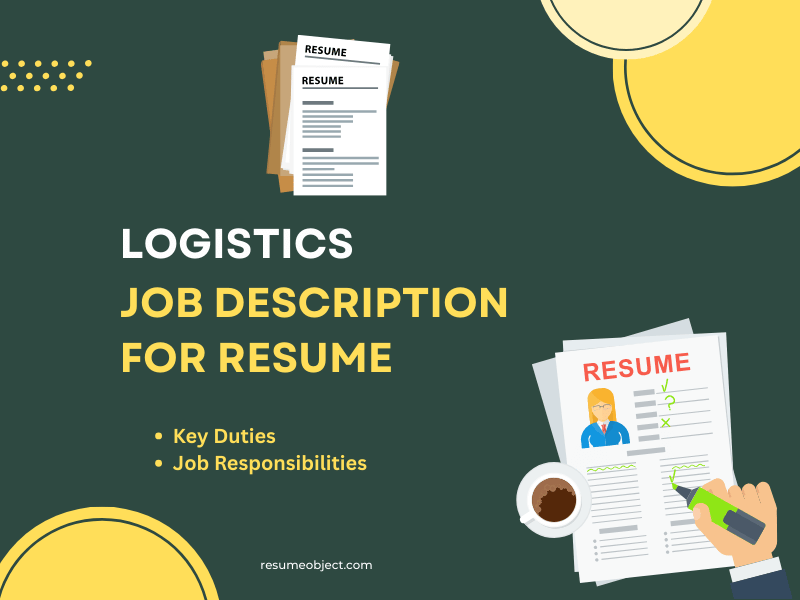
Logistics Job Description for Resume
Discover the essential Logistics Job Description for Resume, including key duties, responsibilities, and action verbs to enhance your application. Stand out to employers with our expert tips and insights!
Key Duties
Coordinate transportation and shipping schedules
Manage inventory and stock levels
Monitor and optimize supply chain processes
Prepare and maintain shipping documentation
Collaborate with suppliers and vendors
Required Skills
Supply Chain Management
Inventory Control
Data Analysis
Problem-Solving
Communication Skills
Mistakes to Avoid in Job Description
Vague job responsibilities
Overly technical jargon
Lack of measurable achievements
Tips for Job Description
Use action verbs consistently
Highlight relevant skills prominently
Quantify achievements with metrics
Free Resume Templates

